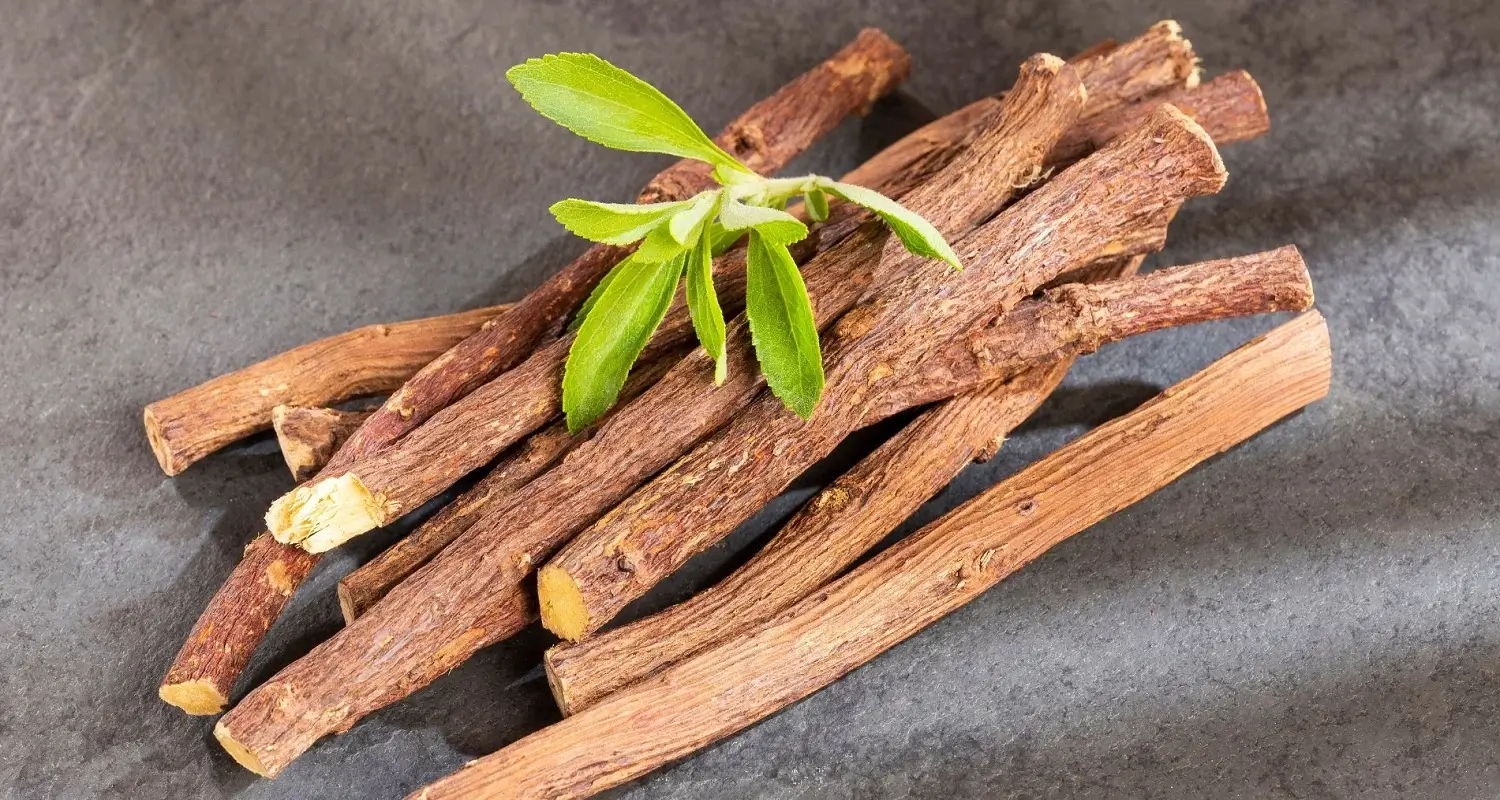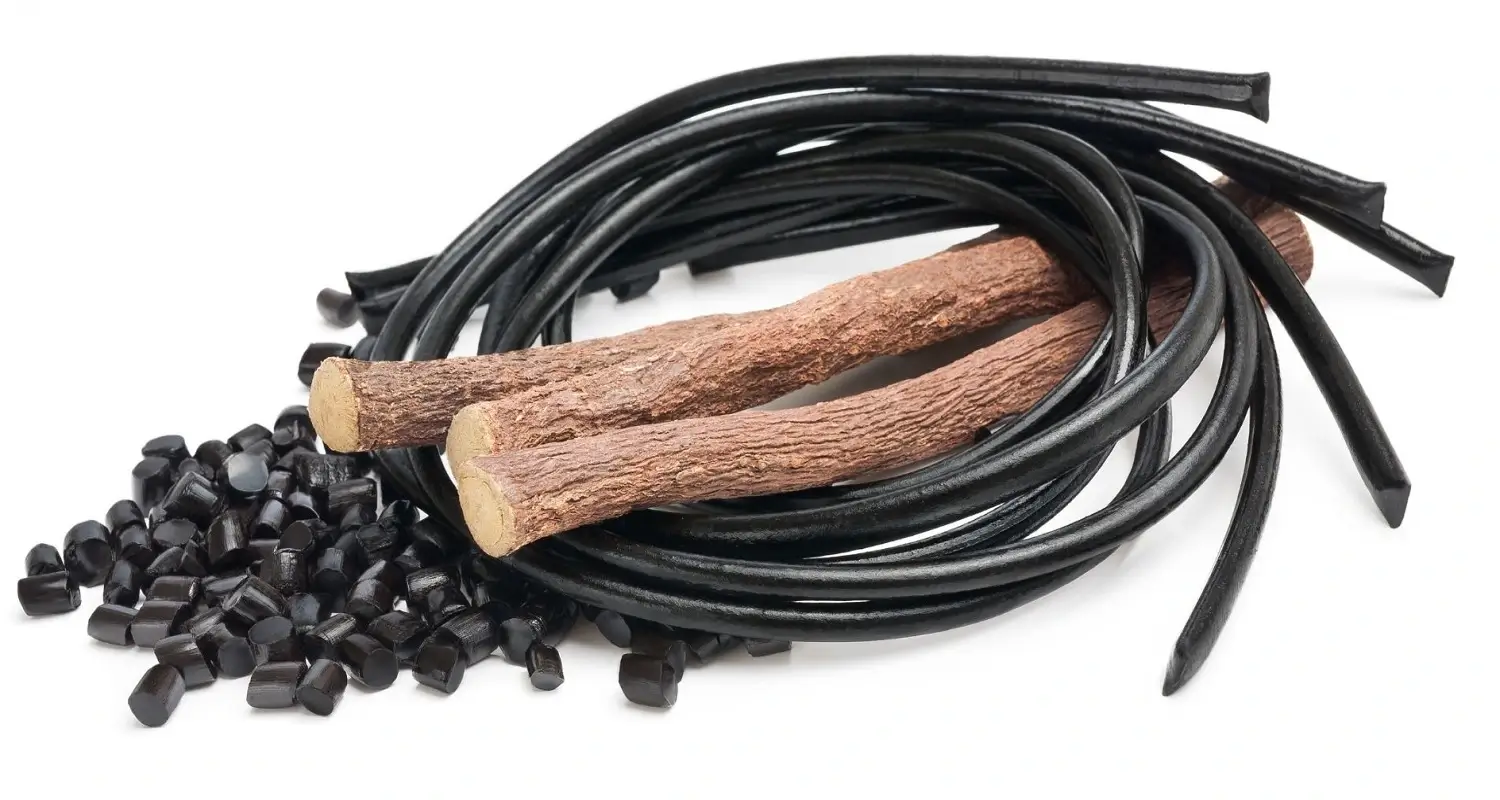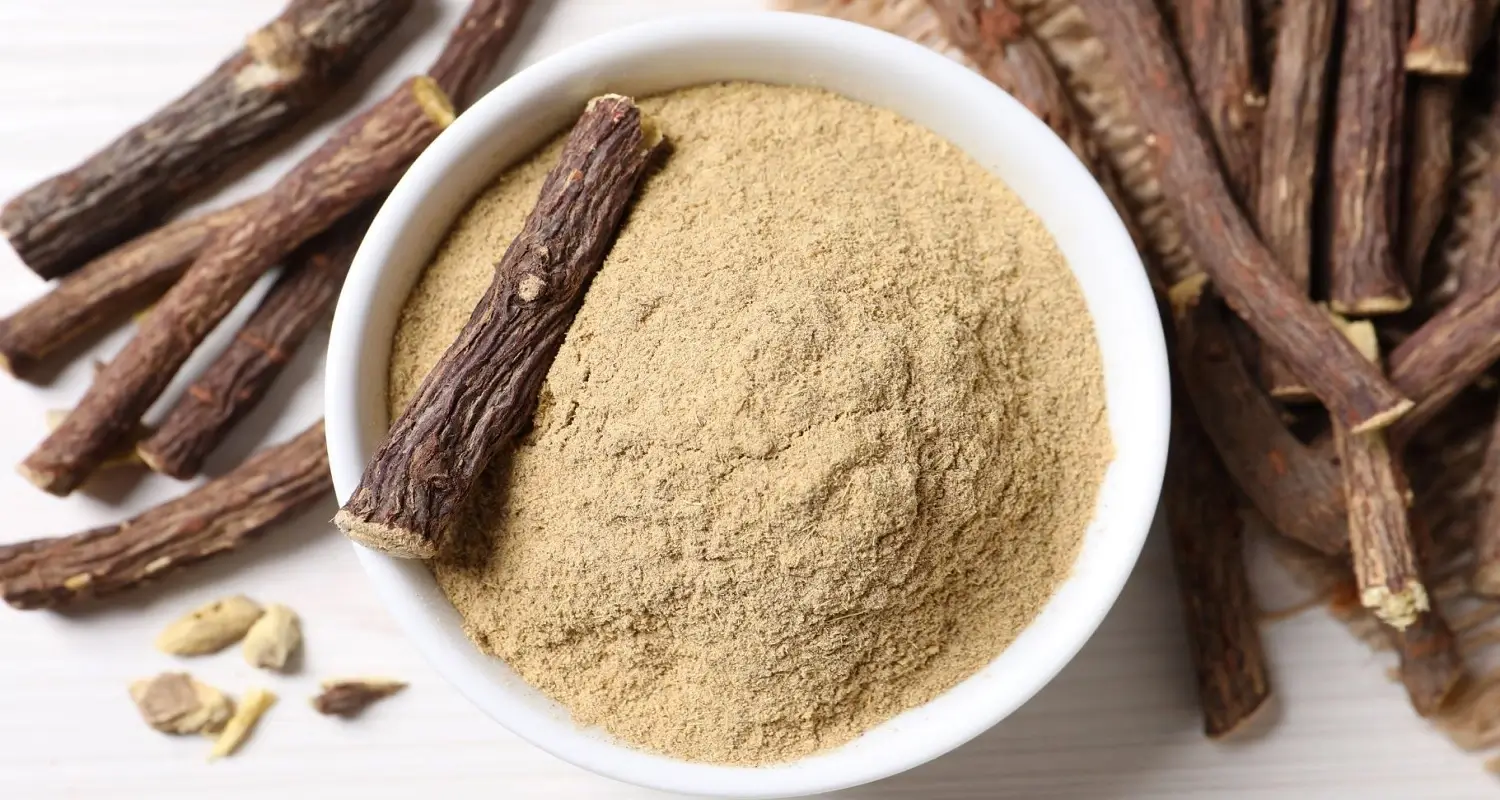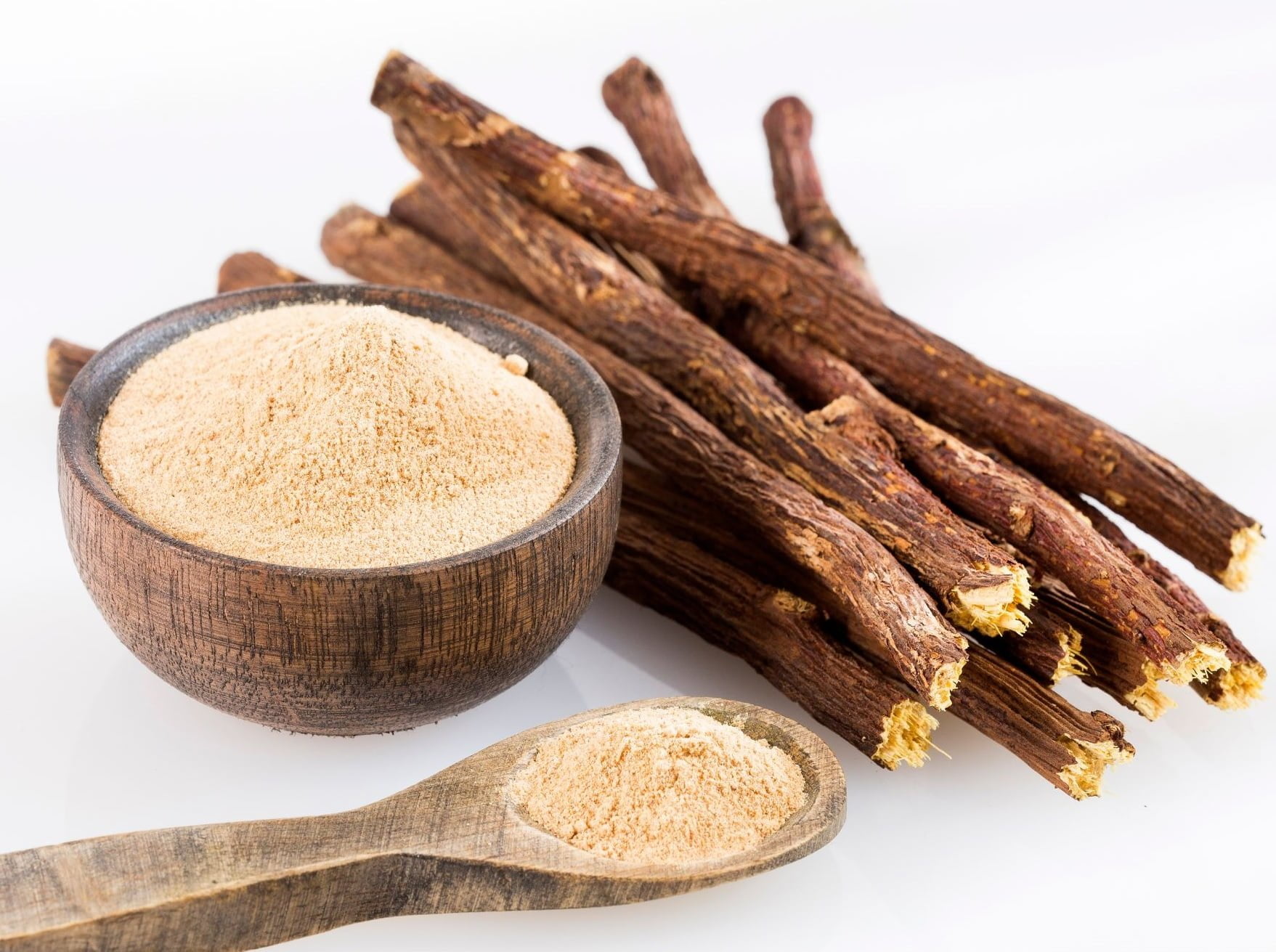Last Updated on: 13th December 2025, 06:03 am
Unanticipated Benefits of Using Licorice Root for Teeth
In this detailed guide, you will discover the surprising benefits of licorice root for teeth. Learn how this root can enhance your dental care routine.
Want to prevent cavities naturally and maintain good oral health, steering clear of synthetic ingredients? Well, licorice root is the right choice for you! Let’s assess this versatile little plant and its many, many advantages!
But wait, before we proceed, let’s learn a bit about the importance of oral health.
Why is Maintaining Oral Health a Good Idea?
Oral health greatly influences our general well-being and quality of life. A healthy mouth contributes not only to better digestion, clear speech, and a confident smile but it also prevents various dental issues like cavities, gum disease, and bad breath, ultimately reducing the risk of more serious health problems such as heart disease and diabetes. Regular oral hygiene practices, like brushing, flossing, and dental check-ups, play a vital role in improving our dental health and overall well-being.
Amid the wide array of dental products available today, natural plant-based alternatives are popular. This root is one such alternative and is commonly used for its numerous health benefits.
What is Licorice Root?

Liquorice is a sweet, moist, soothing herb that belongs to the glycyrrhiza species native to Mediterranean countries and Asia. It has been mentioned in ancient Ayurvedic texts as “Atirasa”, and the dried unpeeled roots of Glycyrrhiza glabra Linn are the most common source. Liquorice, also known as gancao – meaning “sweet herb” in Chinese – has been used by humans for over 4000 years to soothe an upset stomach, reduce inflammation, and treat upper respiratory tract problems. Quite remarkable, isn’t it?
While it contains hundreds of plant compounds such as glabridin, licoricidin, and licorisoflavan that aid in its medicinal prowess, licorice root’s primary active compound is glycyrrhizin. It is responsible for the root’s sweet taste, as well as its anti-inflammatory, antioxidant and antimicrobial properties.
How Does Licorice Root Benefit Oral Health?
Utilizing licorice root as part of DIY dental care provides various health benefits such as fighting off harmful bacteria, reducing inflammation, and preventing cavities and gum disease, not to mention that it freshens breath.
Come along, let’s delve deeper into the numerous oral health benefits provided by this amazing plant!
1. Fighting Bacteria and Preventing Tooth Decay
Licorice root has proved to be effective in preventing tooth decay due to its antibacterial properties. In a recent study examining licorice’s antibacterial potency, participants consumed sugar-free orange-flavored licorice lollipops containing glycyrrhizol A, twice daily for 10 days.
The study demonstrated a significant decrease in salivary S. mutans, the primary bacteria associated with tooth decay, confirming its effectiveness. Did you know that this root along with its anti-cariogenic activity also aids in teeth whitening? Pretty cool, heh! However, further research is needed to establish the optimal dose and form for safe and effective usage.

2. Reducing Inflammation and Treating Gum Disease
Among its many advantages, licorice root offers anti-inflammatory and anti-microbial properties that help fight gum disease by inhibiting the growth of harmful bacteria such as P. gingivalis and preventing plaque buildup to ensure good oral health. It also reduces pain and discomfort, making it a useful natural remedy and a viable alternative to synthetic ingredients!
3. Natural Alternative for Mouth Freshness
One of the problems with mainstream mouthwashes is that they’re way too powerful. They not only target bacteria that cause bad breath, but they also eliminate beneficial bacteria, drying out your mouth entirely, which over time, can make bad breath even worse.
Herbal rinses are a better option, particularly if they contain botanicals known to be effective against odor-causing bacteria. According to new research, licorice root may just be one of them.
Apart from being a potent solution for gum disease treatment and preventing tooth decay, this root offers a plethora of other healthcare benefits such as preventing oral cancer and candidiasis, aiding in better digestion, reducing acid reflux, helping with acne, etc.
Go on, what are you waiting for? Use licorice root-based products and make it a part of your daily oral hygiene routine, starting today!
DIY Dental Care Tips Using Licorice Root

Licorice root for oral health is a wonderful discovery, dating back to ancient times. But how do you incorporate it into your daily oral hygiene routine? Listed below are a few tips that might help!
● Licorice root chewing sticks: Chew on licorice root sticks as a natural way to clean your teeth and freshen your breath.
● Licorice root powder: Add licorice root powder to homemade toothpaste or mouthwash for its antibacterial properties. Be sure to use organic, food-grade licorice root powder.
● Licorice root mouthwash: Make a licorice root mouthwash at home by adding the powder to water and swishing it around in your mouth for about 20-30 seconds.
● Licorice root toothpaste: Mix licorice root powder with baking soda and coconut oil to create a homemade toothpaste. This combination helps fight bacteria and plaque while freshening your breath.
● Licorice root tea: Steep licorice root slices or powder in hot water for 10-15 minutes. Strain the liquid and drink it after it has cooled down.
● Licorice root candy: Licorice root lollipops have been shown to effectively prevent tooth decay, benefiting children who crave lollipops without compromising their dental health.
Precautions and Considerations

While licorice root offers significant benefits for oral health, it also comes with potential side effects. A few are discussed below: Glycyrrhizin, its main bioactive ingredient, has been shown to cause an abnormal increase in the stress hormone, cortisol, which may cause imbalances in fluid and electrolyte levels, As a result, some products use deglycyrrhizinated licorice (DGL), with the glycyrrhizin removed.
This root is associated with several other side effects, including:
● High blood pressure
● Headaches
● Diarrhea
● Constipation
● Vomiting and fatigue
● Allergic reactions such as asthma
●Adverse drug reactions with blood thinners, blood pressure medications, statins, etc
● Risky for pregnancy as it causes a hormonal imbalance
You know what they say—nothing’s perfect! With plenty of positives, there are bound to be a few negatives. But don’t you worry; as long as this wonderful herb is used within limits, it is completely safe to use!
Conclusion
To conclude, licorice root offers innumerable healthcare benefits that can be put to good use, provided it is being used under the guidance of a healthcare professional. Begin using this sweet root today and enjoy its multitude of benefits!
Frequently Asked Questions
Can licorice root help in whitening teeth?
Licorice root possesses properties that have the potential to lighten dental hues. However, its effectiveness as a whitening agent is not well-established.
How often should I use licorice root for oral health?
It is suggested to use about 1-2 times daily, under the guidance of a healthcare professional.
Are there any risks associated with using licorice root for a long time?
Not as such, but there are a few potential side effects you need to be wary of.
Can children use licorice root for oral health maintenance?
Certainly! Licorice root lollipops have become increasingly popular. Instead of providing them with candies with high sugar content, opt for this healthier alternative for a little treat!
How does licorice root compare to other natural oral care remedies?
Licorice root serves as a comprehensive solution, offering multiple oral healthcare benefits all by itself! More like an all-in-one thing.
Share:
References
1. Dodds, M.W., & Roland, S. (2012). The role of natural products in oral health and hygiene: A review of the current evidence. Journal of Natural Science, Biology and Medicine, 3(2), 26-32. DOI: 10.4103/0976-9668.101899
2. Messier, C., Epifano, F., Genovese, S., & Grenier, D. (2012). Licorice and its potential beneficial effects in common oro-dental diseases. Oral Diseases, 18(1), 32-39. DOI: 10.1111/j.1601-0825.2011.01842.x
3. Sharma, S., Sogi, G. M., Saini, V., Chakraborty, T., & Sudan, J. (2022). Effect of liquorice (root extract) mouth rinse on dental plaque and gingivitis – A randomized controlled clinical trial. Journal of Indian Society of Periodontology, 26(1), 51–57. https://journals.lww.com/jisp/pages/default.aspx
4. Sidhu, P., Shankargouda, S., Rath, A., Hesarghatta Ramamurthy, P., Fernandes, B., & Kumar Singh, A. (2020). Therapeutic benefits of liquorice in dentistry. Journal of Ayurveda and integrative medicine, 11(1), 82–88. https://www.ncbi.nlm.nih.gov/pmc/articles/PMC7125382/
5. Shaikh, S., & Kumar, S. M. (2017). Beneficial effects of specific natural substances on oral health. Saudi medical journal, 38(12), 1181–1189. https://smj.org.sa/content/38/12/1181
6. Chen, Y., Agnello, M., Dinis, M., Chien, K. C., Wang, J., Hu, W., Shi, W., He, X., & Zou, J. (2019). Lollipop containing Glycyrrhiza uralensis extract reduces Streptococcus mutans colonization and maintains oral microbial diversity in Chinese preschool children. PloS one, 14(8), e0221756. https://journals.plos.org/plosone/article?id=10.1371/journal.pone.0221756
- Nayibe Cubillos M. [Author]
Pharmaceutical Chemestry |Pharmaceutical Process Management | Pharmaceutical Care | Pharmaceutical Services Audit | Pharmaceutical Services Process Consulting | Content Project Manager | SEO Knowledge | Content Writer | Leadership | Scrum Master
View all posts
A healthcare writer with a solid background in pharmaceutical chemistry and a thorough understanding of Colombian regulatory processes and comprehensive sector management, she has significant experience coordinating and leading multidisciplina...Recent Posts















